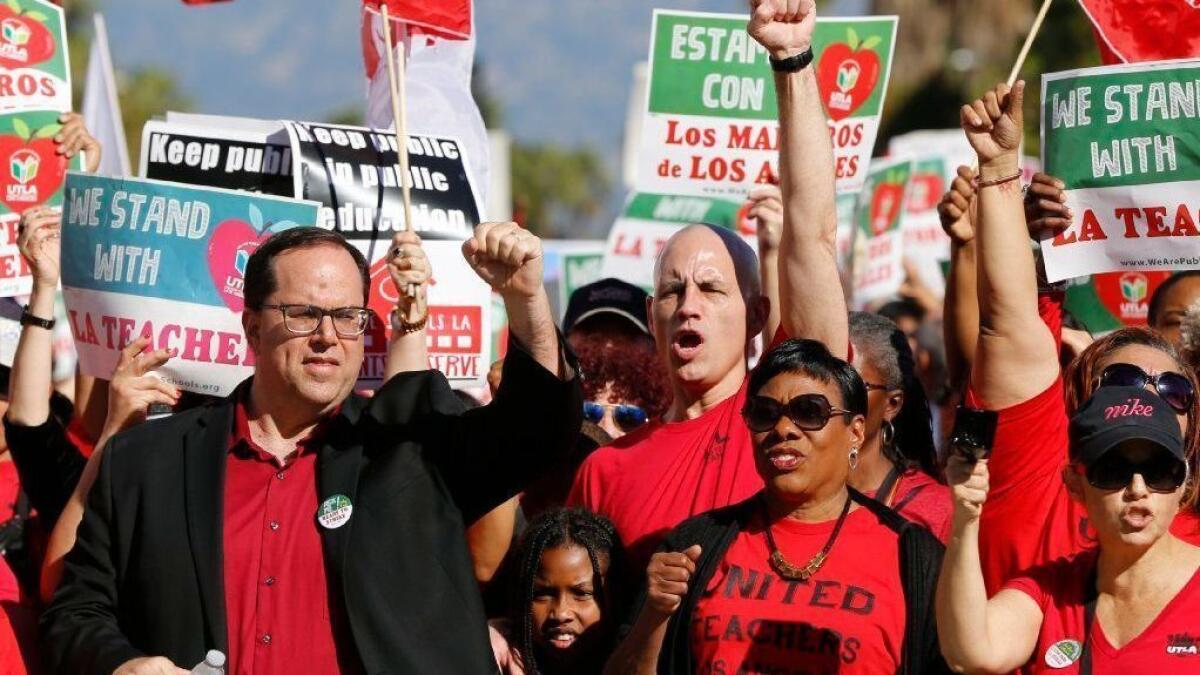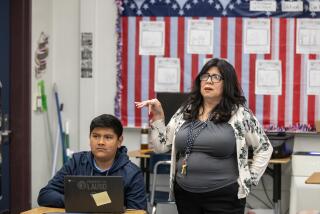Op-Ed: If Los Angeles teachers strike, poor students will lose

- Share via
Los Angeles is at a crossroads that demands our urgent attention.
After many months of collective bargaining, United Teachers Los Angeles has set a strike date for Jan. 10. If there’s no deal with the Los Angeles Unified School District by then, some 30,000 teachers, counselors, nurses, librarians and other members of the teachers union will stop providing services to our schools.
The collective bargaining process is fundamental to a healthy community and democracy. But avoiding a strike is in the best interest of our city, and particularly our most underserved communities.
There is still hope that an agreement can be reached. A fact-finding report provided by a neutral third party has outlined a path forward. We urge the teachers union and the district to use it as a framework for an agreement.
To be clear, we are not picking sides. Rather, we are advocating for children and parents while fully supporting the teachers who serve them.
Los Angeles’ low-income families bear many burdens. They are contending with swelling rents, an uptick in homelessness, persistent exposure to gun violence and a lack of community resources.
Our city asks black and brown communities, who often have the least, to endure the most. Now it appears the most vulnerable families will be made to shoulder yet another strain: a school shutdown with no end in sight.
Research shows that students in areas with high poverty rates lose out on instruction time compared with their peers in more affluent areas. In L.A. Unified, where the majority of students are low-income students of color, who as a group aren’t reading or doing math at grade level, every day of learning counts. If teachers strike, instruction will fall even further behind and leave these students languishing.
L.A.’s public school system provides much more than education. It is also a critical refuge for students who lack support and resources.
For many children, schools provide basic sustenance. A strike could exacerbate their food, housing and safety insecurities. More than 80% of L.A.’s public school students qualify for free or reduced-price meals. If schools close, many of these children will not have access to consistent meals.
Schools that stay open may not have enough supervisors on campus, making it difficult to ensure that students are safe. On top of this, close to 20,000 students in L.A. are homeless. They especially rely on school for shelter, hygiene, food and other essential resources.
L.A. Unified recently began to address challenging equity issues by adopting a new formula called the Student Equity Needs Index. It rates schools throughout the district and provides more resources to those where low-income students lack access to basic safety, health and other community resources. We must do everything possible to keep schools open and equipped to support these children and their families.
Elected officials, along with civic, business and philanthropic leaders, need to put pressure on both the school district and the teachers union to resolve their differences and avert this strike.
Enter the Fray: First takes on the news of the minute from L.A. Times Opinion »
Gavin Newsom will begin his tenure as governor days before the strike is scheduled to begin. L.A. Unified is California’s largest school district, and the moment demands Newsom’s leadership.
The school district’s fiscal challenges — including ballooning pension and healthcare costs — must be addressed head-on. Sacramento needs to pony up more money for our schools. There is no reason why California should rank 41st in the country when it comes to per-pupil spending.
California’s tax and fiscal policies ought to be reformed in order to boost revenues to schools and communities. If L.A. Unified got more money from Sacramento, it could more readily and sustainably give teachers what they are rightly demanding: smaller class sizes, higher salaries and more counselors.
The state budget is a reflection of our values. And a city is only as strong as its schools. State, civic and community leaders should not sit on the sidelines and allow our children to bear the brunt of our mistakes. Let’s urge both parties toward an agreement.
Fred Ali, Antonia Hernández and Robert K. Ross are CEOs of the Weingart Foundation, the California Community Foundation and the California Endowment, respectively.
Follow the Opinion section on Twitter @latimesopinion or Facebook
More to Read
A cure for the common opinion
Get thought-provoking perspectives with our weekly newsletter.
You may occasionally receive promotional content from the Los Angeles Times.










